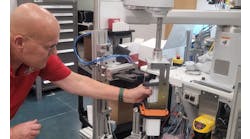Process control engineers and other technical professionals don't talk like robots, so why do they write like robots?
I ask this question because I've spent way more time than I expected over the past 20 years correcting submitted texts to add contractions. You know, turning "is not" into "isn't," "I have" into "I've," and "they are" into "they're," etc. I've asked contributors and some colleagues alike to use these common contractions on their own to save me a little time, but most are stubbornly devoted to speaking in the most formal and stilted language possible.
The reason I use contractions and advocate for them is that—beyond saving words, syllables and time—I was informally trained use them by the newspaper editors I worked for many years ago. In the face of the Internet of their day, namely radio and TV, newspapers had to give up the formal language they'd traditionally used, and mainly in the 1970s, adopted more conversational writing styles they hoped would be more appealing to readers, even as they maintained essential accuracy. This didn't stop the multi-media flood that continues today, of course, but I think writing for readers in the same way I'd talk to a friend or co-worker is still the best way to get facts across and explain situations, so they'll have the best chance of being understood and useful to the listener, reader or viewer.
And I don't think I'm alone in this opinion. Everyone knows about the famous "elevator speech" in which someone tells a friend the highlights of an event or pitches a client on the highlights of a proposal. We must love these tidbits because we have a variety of nicknames for them from "cut to the chase" to "the bottom line." I just call them headlines and captions, and I always try to pack into them as much of a story as possible because I know they'll be all that many readers have time for.
So, what's holding back engineers and other technical folks from writing as plainly as they usually speak? Well, I'm betting it's the same lack of awareness that affect professionals writing in many fields I've encountered over the years. Granted, most strive for technical accuracy, but their efforts often appear to stop short of achieving successful communications with their audience.
I also think many technical people are still writing as if they were in school, and competing for grades, praise or neatness. Some are just arguing, pushing products, puffing themselves up, of course, and their bloviating in text is almost as obnoxious as it is in person. Others are just stuck in that old ivory tower or its corporate, cubical-based equivalent, where they've likely produced volumes of research and result, but believe they can't reach anyone in the larger world because they're cut off by so many divisional layers and bureaucracies—even within their own companies and organizations.
Whatever the reason or combination, they're not aware, not thinking of, or maybe not caring too much about their audience. I think that falling back on default formal language, including not using contractions, is a symptom of this detachment and isolation, but it also indicates a deep undercurrent of insecurity. We use contractions with friends. We don't use them when we're scared, or just lazy because we assume no one's going to read what we wrote. Laziness is just a slightly more acceptable form of fear.
This is a shame because a lot more good information and insights would get across from technical experts to people who could benefit from them if their authors could believe it was possible and worth doing. Competence and expertise must come first, so we can be sure what we're taking about, but this willingness to reach out and write accessibly for a potential audience is crucial. This is especially true now, when there's so much rapid technological change, and so much confusion that's both accidental and organic as well as premeditated and on purpose.
Logic and reason always need friends. This is why technical experts must be willing to reach beyond their cubicles to less well-informed colleagues in their own fields and related ones, too. Enlightenment just can't run in the opposite direction.






